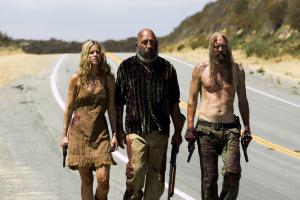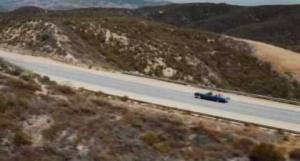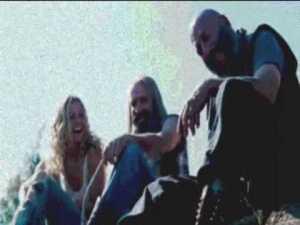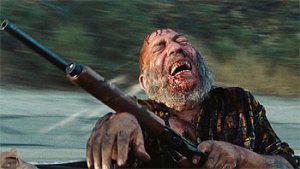From the beginning, The Devil’s Rejects sets out on a different journey than its predecessor House of a 1000 Corpses. Attaching itself to the personal narrative more so than a typical horror, it attempts to question the paths we choose in life and how we will be remembered once we have passed. A story about the structure of family and trying to survive in a world gone wrong, The Devil’s Rejects shows how that sometimes in film, a song paired with images can finalize a narrative without a closing.
Spoiler Alert – In the final scene filmed on a desolate section of highway, the remaining members of the Firefly family engage in a shootout with police who have no interest in taking them alive; the Firefly family agrees. This scene is paired with the song Freebird by Lynyrd Skynyrd; a song most people have heard and have formed a relationship with for a multitude of reasons. Their deaths are expected, but at the last moment the frame freezes with a heavy sound of blood pumping before guns begin blaring like
Butch Cassidy and the Sundance Kid. We do not see them die.
The first half of the narrative is filled with the violence and force established in House of a 1000 Corpses. Tyler Bates’ score is fitting in its vast, ambient and at times bombastic quality. The sound matches the tone of the score creating an eerie, nails on chalk board aesthetic and is blended so seamlessly it’s impossible to know where one begins and the other ends. They balance each other out to create a mood and sense of place that pulls on the audience instilling a world unto itself.
However, half way through the film takes a severe turn and reveals it no longer has to play that game. It starts to push heavily on the family dynamic and builds upon the myths of cinema recapitulating outlaw narratives from Butch Cassidy and the Sundance Kid to Bonnie and Clyde and Badlands while positioning human beings under the direst of circumstances. Though still violent and disturbing, it works diligently to present a family trying to survive in a world they don’t quite understand.
This is how the source music comes into play. Starting with Dark was the Night, Cold was the Ground by Blind Willie Johnson, it establishes a certain time and place for the characters creating distinct cultural connections that allow the film to transcend its location. It allows for a distant closeness mythic in proportions, but human in execution.
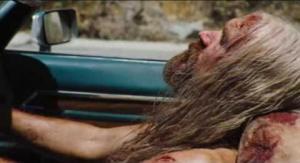
Freebird finalizes this line of thought. It’s an epic transition isolating the situation and mythologizing the characters that allows them to go out in a blaze of glory. They are fulfilling their destiny. They cannot be good by society’s standards and cannot change. The ending is romantic and allows our characters to move on to the desolate freeway of the end credits as a family. But, in between it’s blood and bullets. They don’t get to die. They are not set free. Their story fades into the sunset amongst the cinematic outlaws that try to live forever among the memories of the dead. The film begins and ends with myths fueled by a vast America teeming with violence and decrepitude. It thrives on building a scenario of intensity to cloud over the reality of insecurity, unknowingness and regret. It’s a story about life and death; a story we all know.
